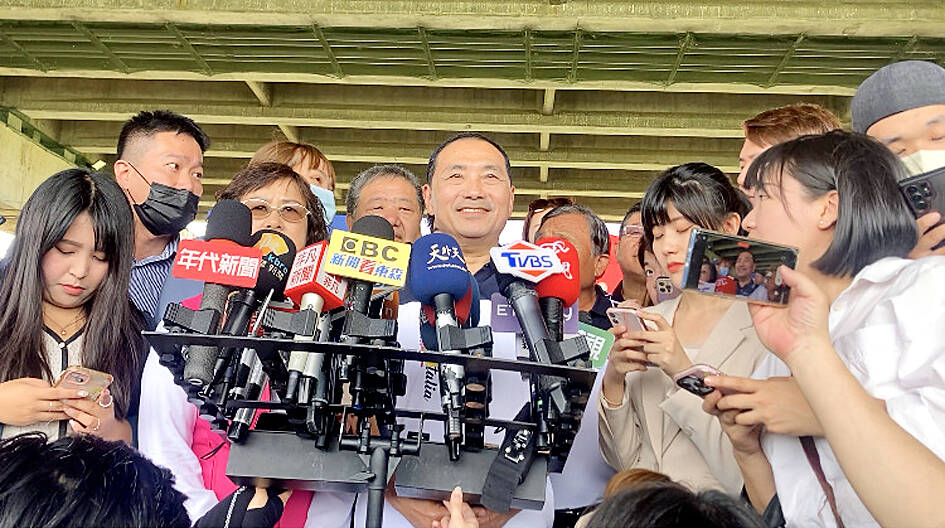The Chinese Nationalist Party (KMT) yesterday urged supporters to show patience after the popularity of its presidential candidate, New Taipei City Mayor Hou You-yi (侯友宜), declined in a public opinion poll.
Hou’s support rating fell from 26 percent to 18.3 percent, the lowest among the three presidential hopefuls declared so far, a monthly poll by my-formosa.com showed on Monday.
Support for Vice President William Lai (賴清德), the Democratic Progressive Party’s (DPP) presidential candidate, rose marginally from 35.4 percent to 35.8 percent, while Taiwan People’s Party (TPP) presidential candidate and Chairman Ko Wen-je’s (柯文哲) support rose from 22 percent to 25.9 percent.

Photo: Chueh Ching-lun, Taipei Times
Separately, a TVBS poll published this month showed that support for Hou stood at 30 percent, while support for Lai was 27 percent.
A TVBS poll two months earlier showed Hou with support of 32 percent and Lai with 28 percent.
KMT spokesman Lin Chia-hsing (林家興) yesterday said that Hou’s popularity should improve in light of his recent comments regarding the death penalty and the nation’s energy policy.
Hou on Monday said he believes nuclear power should be on the table for Taiwan and that he has always supported the death penalty.
The party headquarters studied the data and expect Hou’s statements to inspire support from base and swing voters, Lin said.
Asked whether the KMT’s failure so far to integrate support for Hon Hai Technology Group founder Terry Gou (郭台銘), who failed to secure the KMT’s presidential nomination, has negatively affected Hou’s popularity, Lin said the situation is out of the party leadership’s hands.
The KMT has open lines of communication with Gou and continues to hope that he will work with it to bring down the DPP administration, Lin said.
Separately yesterday, Hou refused to directly respond to reporters’ questions about his apparent drop in support.
“What is important is that we must identify issues that trouble people and ease their suffering with effective policies,” Hou said.
“We hope to build a peaceful, stable, prosperous and orderly nation,” he said. “I will brief you all on national policies concerning these points at a later time.”
Asked to comment on rumors that the KMT might replace him as its presidential candidate if his support continues to remain below 20 percent, Hou said: “We will remain united in the face of any problems, and work ceaselessly for the city with all our effort.”

Taiwanese can file complaints with the Tourism Administration to report travel agencies if their activities caused termination of a person’s citizenship, Mainland Affairs Council Minister Chiu Chui-cheng (邱垂正) said yesterday, after a podcaster highlighted a case in which a person’s citizenship was canceled for receiving a single-use Chinese passport to enter Russia. The council is aware of incidents in which people who signed up through Chinese travel agencies for tours of Russia were told they could obtain Russian visas and fast-track border clearance, Chiu told reporters on the sidelines of an event in Taipei. However, the travel agencies actually applied

New measures aimed at making Taiwan more attractive to foreign professionals came into effect this month, the National Development Council said yesterday. Among the changes, international students at Taiwanese universities would be able to work in Taiwan without a work permit in the two years after they graduate, explainer materials provided by the council said. In addition, foreign nationals who graduated from one of the world’s top 200 universities within the past five years can also apply for a two-year open work permit. Previously, those graduates would have needed to apply for a work permit using point-based criteria or have a Taiwanese company

The Shilin District Prosecutors’ Office yesterday indicted two Taiwanese and issued a wanted notice for Pete Liu (劉作虎), founder of Shenzhen-based smartphone manufacturer OnePlus Technology Co (萬普拉斯科技), for allegedly contravening the Act Governing Relations Between the People of the Taiwan Area and the Mainland Area (臺灣地區與大陸地區人民關係條例) by poaching 70 engineers in Taiwan. Liu allegedly traveled to Taiwan at the end of 2014 and met with a Taiwanese man surnamed Lin (林) to discuss establishing a mobile software research and development (R&D) team in Taiwan, prosecutors said. Without approval from the government, Lin, following Liu’s instructions, recruited more than 70 software

Chinese spouse and influencer Guan Guan’s (關關) residency permit has been revoked for repeatedly posting pro-China videos that threaten national security, the National Immigration Agency confirmed today. Guan Guan has said many controversial statements in her videos posted to Douyin (抖音), including “the red flag will soon be painted all over Taiwan” and “Taiwan is an inseparable part of China,” and expressing hope for expedited reunification. The agency last year received multiple reports alleging that Guan Guan had advocated for armed reunification. After verifying the reports, the agency last month issued a notice requiring her to appear and explain her actions. Guan